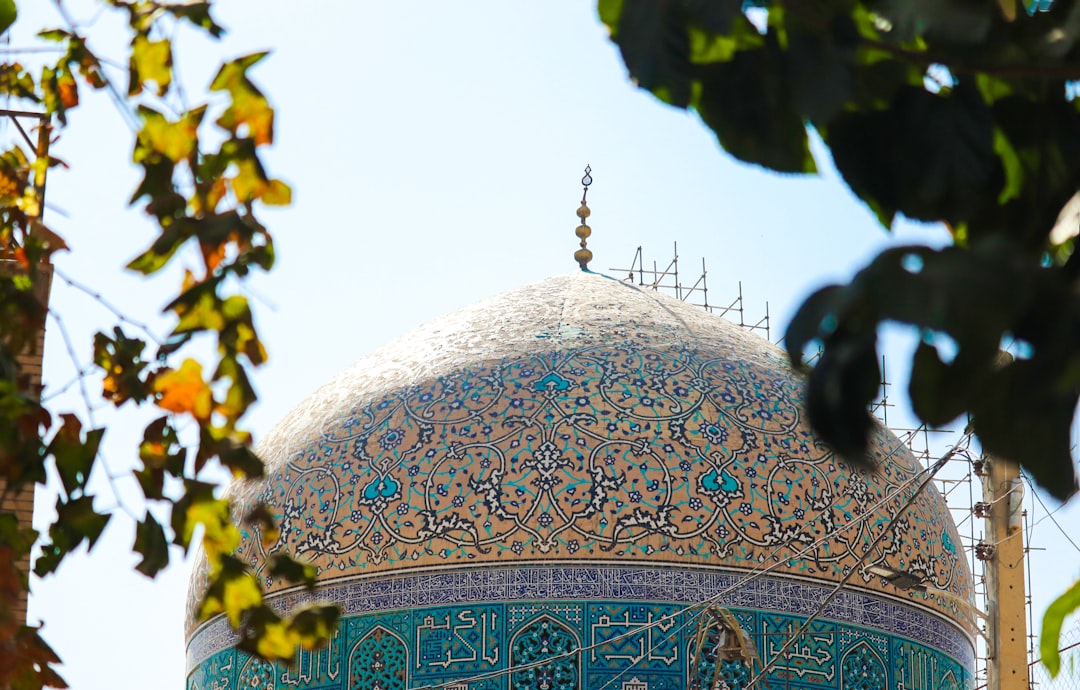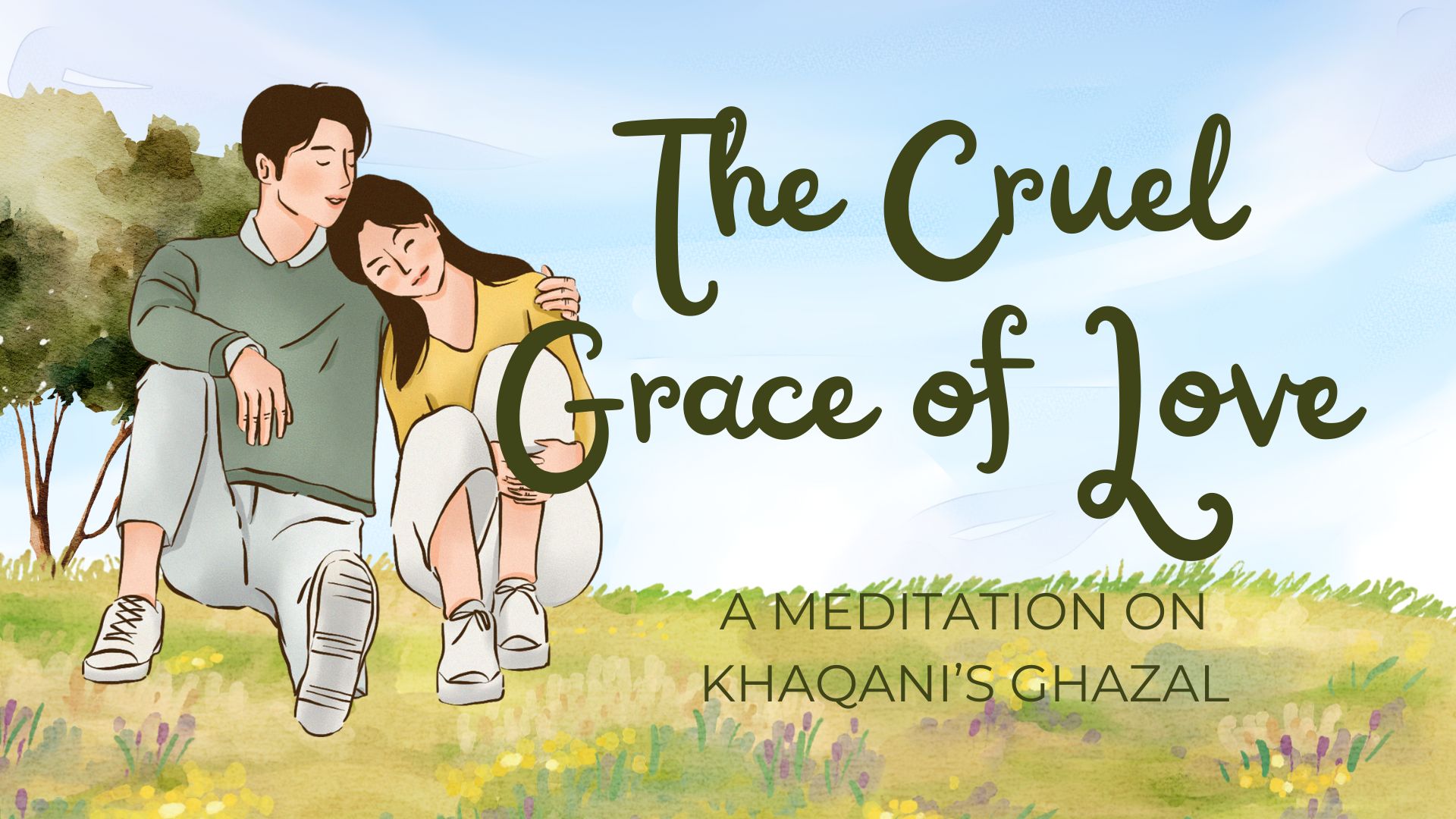There is a cup, passed from hand to hand, filled with wine that glows in the morning light.
In the gathering of lovers, one hand pours and another receives.
But not all cups are equal — not all hearts are chosen.
And in this difference, in this quiet injustice of affection, begins the ache of the soul.
ای که در جام رقیبان می پیاپی میکنی
خون دل در ساغر عشاق تا کی میکنی
مینوازی غیر را هر لحظه از لطف و مرا
دم به دم خون در دل از جور پیاپی میکنی
راه اگر گم شد نه جرم ناقه از سرگشتگی است
بی گناه این راهپیما ناقه را پی میکنی
ناله و افغان من بشنو خدا را تا به کی
گوش بر آواز چنگ و نالهٔ نی میکنی
ساقیا صبح است و طرف باغ و هاتف در خمار
گر نه در ساغر کنون می میکنی کی میکنی؟
Hatef Esfahani begins his ghazal with an image that is at once earthly and celestial:
"O you who pour wine into the cups of rivals again and again — how long will you fill the goblet of the lovers with the blood of their hearts?"
In these few words, a whole world of feeling is born. The lover speaks not in anger, but in wonder — why must love always wound the ones who love the most? Why does the beloved, radiant and unreachable, show kindness to others, yet turn a face of indifference to the one whose heart burns with devotion?
The Persian mystics often described love as a divine intoxication — a state where the soul, in its yearning for the Infinite, mistakes the human for the Divine. The wine is love itself, poured by the hand of the Beloved, and each heart is a fragile cup trembling to receive it. Yet the Beloved — whether human or divine — gives not equally. Some hearts overflow, others are left empty, cracked, or stained with longing.
In the realm of love, fairness has no meaning.
To love is to surrender reason.
To love is to drink from a cup that may never be filled.
The Cruel Tenderness of Love
Hatef continues:
"You charm others every moment with kindness, and me — each breath, you fill my heart with blood through endless cruelty."
How familiar that feeling is. The one we love smiles upon the world, yet turns away from us. The same lips that bless others wound us with silence. The same gaze that brings joy to strangers pierces our heart with indifference.
And yet — we do not stop loving.
Love, real love, does not depend on return. It burns simply because it must.
Here lies the paradox that Hatef captures so beautifully: the beloved’s cruelty is not the end of love — it is its fire. Each act of neglect deepens the lover’s surrender. Each unkind glance becomes another reason to stay, to hope, to ache.
This is not weakness. This is the secret power of love — that it transforms pain into devotion, distance into nearness, silence into music.
The mystics knew this well. They said that the Beloved hides not to reject us, but to teach us longing. For longing is the bridge between the finite and the infinite.
A heart without longing is a heart asleep.
But a heart that yearns — even in pain — is awake, alive, and luminous.
The Wound as a Path
In the next verse, Hatef writes:
"If the path is lost, it is not the fault of the camel for its confusion. You make this guiltless traveler’s mount go astray."
Here, the lover turns inward. He no longer blames the beloved for cruelty alone — he recognizes that even his wandering, his confusion, his missteps, are part of a greater design. The lost road of love is not truly lost; it is guided by unseen hands.
How often, in love and in life, we think we have strayed from the way — that we’ve made mistakes, that our devotion has led us nowhere. But perhaps it is not error that brings us to these deserts of the heart. Perhaps the Beloved, unseen, is leading us through them, reshaping us in silence.
Love is a journey through bewilderment. It begins with clarity — a name, a face, a desire — and ends in mystery. The further we walk, the more we lose the sense of who is loving and who is loved. The “I” dissolves. The “you” fades. What remains is only the pulse of love itself — endless, formless, free.
The camel, weary and lost, keeps walking not because it knows the road, but because the heart remembers the destination. Even in confusion, love moves forward. Even in despair, something in us keeps seeking the light.
The Silence Between Two Songs
Then comes the verse that trembles with loneliness:
"Hear my cries, for God’s sake! How long will you keep your ears on the sound of the harp and the melody of the flute?"
It is a plea from the depths of a human soul — not for love alone, but for recognition.
“Hear me. See me. I am here, and I am breaking.”
We live in a world of distractions — music, noise, pleasure, beauty — and yet, within each of us, there is a faint voice that says: listen to me.
It is the voice of the heart — fragile, forgotten, but alive.
The beloved in the poem listens to songs and laughter, but not to the cries of the lover. This image cuts deep. It is the moment when love feels like invisibility, when your existence fades in the eyes of the one who means everything. But even this pain is sacred, because in that silence, we discover a deeper presence.
When no one listens, we begin to hear ourselves.
When love is denied, the soul begins to speak.
There is a kind of music that rises from the heart’s ache — a rhythm that no harp can play. It is the music of becoming. The lover’s cry, ignored by the world, echoes in the inner chambers of being until it transforms into wisdom.
To love deeply is to be purified by silence.
The Morning of Awakening
The final couplet of the ghazal is filled with dawn light:
"Cupbearer, the morning has come — and Hatef, in the haze of longing, still thirsts. If you do not pour the wine into the cup now, then when will you?"
After all the pain, the jealousy, the wandering, and the plea, comes this moment of surrender. The night has ended. The cup is still empty. But the lover no longer demands — he invites.
There is no bitterness left, only readiness.
“If not now, when?”
This is the cry of a heart that has passed through suffering and emerged awake.
The morning is not just the time of day — it is the moment of realization. The lover realizes that love itself was the wine, that longing itself was the path, that the Beloved was never truly absent.
The mystics call this baqā — the state of subsistence after annihilation, when the self that was burned in love’s fire returns, but changed, illumined. The same lips that once complained now whisper gratitude. The same tears that once mourned now reflect the dawn.
And so the poem ends not with despair, but with awakening. The lover is still longing, still waiting for the pour — yet that waiting itself has become sacred.
Love as a Mirror
Hatef Esfahani’s ghazal, though brief, unfolds like a universe.
It begins with jealousy and ends with surrender.
It travels from complaint to communion.
And along the way, it teaches us what it means to love — not as possession, but as transformation.
In the mirror of the beloved’s indifference, the lover sees his own truth.
He learns that love is not something we receive; it is something we become.
Every unreturned glance, every unanswered call, every drop of pain — all of it refines us, making us transparent enough for light to pass through. The heart that breaks is the heart that shines.
The Two Faces of the Beloved
In Persian poetry, the beloved often wears two faces — the human and the divine. Hatef’s beloved is both: the one who smiles upon others while turning away from him, and the unseen power that guides his soul through bewilderment.
This duality reflects our own experience. The human love that shakes us, wounds us, makes us tremble — it is often a doorway to something larger. When we fall in love with a person, we are really touching the eternal through a single face. The pain we feel when they turn away is the ache of the soul realizing that no human form can contain the infinite love it seeks.
Thus, every heartbreak is a lesson in expansion. It tears the limits of our desire and opens us to something vast. Hatef’s lover begins as a man yearning for affection, but he ends as a soul yearning for union.
The Alchemy of Longing
There is an alchemy in this ghazal — the transformation of pain into beauty, of despair into prayer.
Love, in its highest form, is not about satisfaction; it is about awakening.
When the beloved gives love easily, the heart rejoices, but it learns little.
When the beloved withholds love, the heart is forced to grow. It learns patience, humility, and the art of seeing beyond appearances.
This is why the mystics say that divine love often comes wrapped in pain. The Beloved denies us only to show us that we already have everything we seek.
Longing, then, is not a curse — it is the fire that turns the raw metal of the heart into gold.
The Eternal Cupbearer
In the closing image, the “cupbearer” (sāqī) becomes a symbol not just of the beloved, but of life itself.
Life is the eternal pourer — it gives and withholds, it intoxicates and sobers, it wounds and heals.
And we, the lovers, must stay awake to receive what is given.
The wine is everywhere — in the laughter of friends, in the ache of memory, in the silence before dawn.
To live poetically, as Hatef teaches us, is to see every moment as a sip from the divine cup.
Whether we taste sweetness or bitterness, it is all wine.
Whether we are chosen or forgotten, it is all part of the feast.
The question, then, is not whether the Beloved will pour, but whether we are awake enough to drink.
A Song for Our Own Hearts
When we listen to Hatef’s ghazal today, centuries after it was written, it feels timeless because the human heart has not changed. We still fall in love with those who do not love us back. We still wander through deserts of silence, still wait for the pour that never comes.
But perhaps that is the very design of love — to keep us searching, feeling, alive.
To love is to be stretched between earth and heaven.
To suffer in love is to be initiated into the mystery of being human.
And to endure that suffering with grace — that is the beginning of wisdom.
When Hatef writes, “If you do not pour the wine now, when will you?” he is speaking not only to a person, but to life itself. He is reminding us that the present moment — this very breath — is the time to open our hearts, to love, to forgive, to see beauty, to drink deeply of existence.
The Final Reflection
Love, as Hatef Esfahani reveals, is not a story of two people — it is the eternal dialogue between the soul and the world.
Every act of love, every heartbreak, every silence, is part of that dialogue.
And when we read his ghazal, we recognize ourselves:
The one who loves too much.
The one who waits too long.
The one who keeps walking through confusion and still whispers, “Pour for me.”
That whisper — that fragile, hopeful voice — is the purest thing we possess.
It is the thread that connects us to the Infinite.
It is what makes us human — and divine.
So let us, like Hatef, hold out our cups to the dawn.
Let us not fear the emptiness.
For the wine of love is already within us — waiting for the moment when we become still enough to taste it.
And when that moment comes, when the heart finally feels the warmth of the pour — we will understand that every sorrow, every sleepless night, every unanswered prayer, was leading us here, to this quiet realization:
That love was never about receiving.
It was always about becoming.





